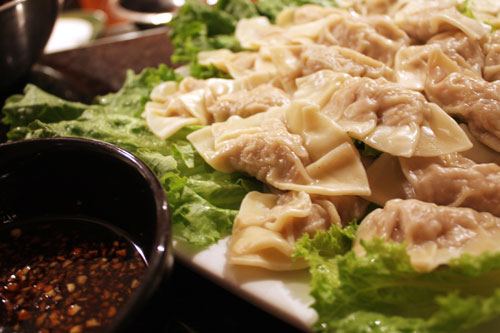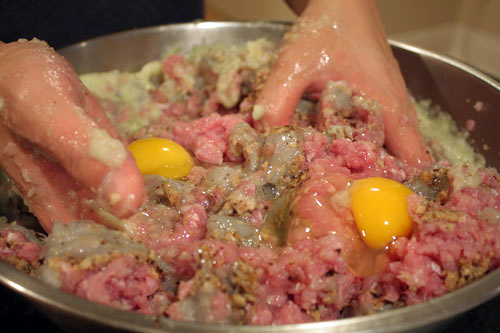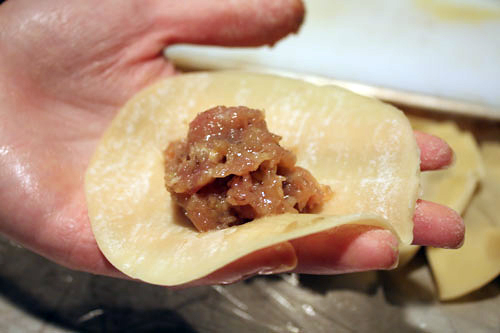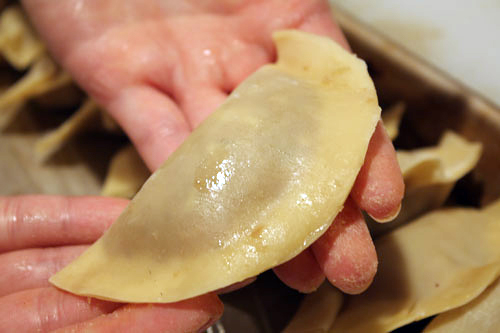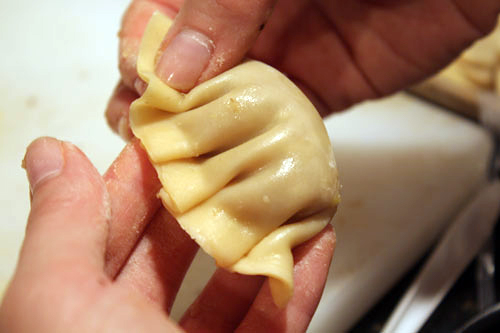You may have seen them out at dim sum. They're made with a chewy, glutinous rice flour dough, filled with a lotus seed or red bean paste, rolled in white sesame seeds, and fried to a golden crisp. The best are the ones that have a very light, thin layer of dough that gives way with an airy crunch when you bite into it, revealing a generous amount of sweet filling.
My mom and her sisters would create an assembly line, and together, they would make hundreds of perfectly round, little, jeen duy to carry them and every auntie, third cousin, and neighbor through the New Year celebrations with something sweet to nibble on.
Without any sisters or a recipe for fresh glutinous rice dough up my sleeve, I decided to take a few liberties with my family traditions and instead, opted to fill my own assembly line with hungry friends, some store-bought wonton wrappers, and a Hua family recipe for jiao zi filling.
Time flew by and before we knew it, our bellies were full of dumpling goodness, our year was looking auspicious, and the freezer was stocked with handmade dumplings, ready to boil for any given easy weeknight dinner.
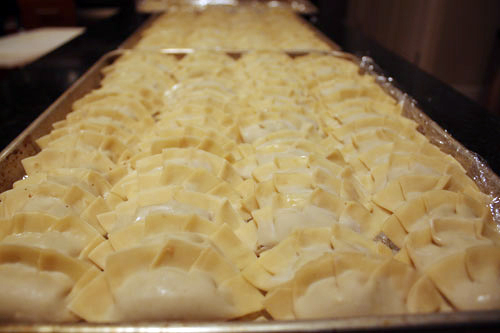
Pork and Shrimp Dumplings (Jiao Zi)
Makes: approximately 80 dumplings
Ingredients:
1 pound ground pork
½ pound shrimp, peeled, cleaned, tails removed
8 dried Chinese mushrooms (1/2 cup after finely chopped)
1 onion (1/2 cup after diced and browned)
½ Napa cabbage (1 cup after finely shredded)
2 eggs
3 tablespoons mushroom-flavored soy sauce
2 tablespoons oyster sauce
1 ½ teaspoon sugar
1 teaspoon sesame oil
1 teaspoon salt
2 packages round wonton wrappers (1 pound each)
Preparation:
1. Soak the dried mushrooms in hot water for about 15 minutes until softened. Squeeze the excess water out, remove stems, and chop into a fine dice.
2. Dice the onion and brown in a frying pan.
3. Finely shred the cabbage until you have 1 cup.
4. Place the shrimp in a food processor and pulse until it is a chunky mixture. Be careful not to over-process, you don't want to create a paste.
5. Combine the pork, shrimp, mushrooms, onion, cabbage, 1 beaten egg (reserve the other one to make an egg wash), and all the remaining seasonings.
6. Knead the mixture with your hands until just combined. Cover and chill for 10 minutes.
7. While mixture chills, line a few large baking sheets with paper towels and dust lightly with flour.
8. Take one of the wonton wrappers and place a small mound of filling in the center (don't over-fill or it will be hard to seal). Dip a finger in the egg wash and dab a little on the bottom half of the wrapper. Fold the top edge over and press to seal, creating a half-moon shape.
Note: If you're short on time or patience, you can cook up the dumplings at this point and have perfectly respectable and delicious jiao zi on your plate. But, if you are ambitious and want to try your hand at fancier looking jiao zi, go on to the next step to pleat your edge.
9. Moisten the curved edge again, and using the thumb and forefinger of one hand, form pleats. Place the dumplings on the lined baking sheets as you complete them, arranging them in 1 layer so they don’t stick to one another.
10. Cook the dumplings in a pot of boiling water (they're done when they float), or in a hot pan. If pan-searing, heat vegetable oil in a skillet until hot, but not smoking. Fry the dumplings until the bottoms are lightly golden, about 2-3 minutes, then add ½ cup water, cover with a lid, and cook until the liquid is evaporated and the bottoms of the dumplings are crisp, 8-10 minutes.
11. Serve dumplings immediately with dipping sauce.
Dipping Sauce
1 tablespoon minced garlic
1 tablespoon minced ginger
2 tablespoons minced green onion
4 tablespoons sweet soy sauce
1 teaspoon sesame oil
½ teaspoon spice vinegar
½ teaspoon sugar
Watch Food and Wine This Week to see Leslie Sbrocco, host of Check, Please! Bay Area in a new segment on local food and wine trends. This week, a conversation about celebrating the food and traditions of the Chinese New Year with Bay Area Bites bloggers, Thy Tran and Stephanie Im.
